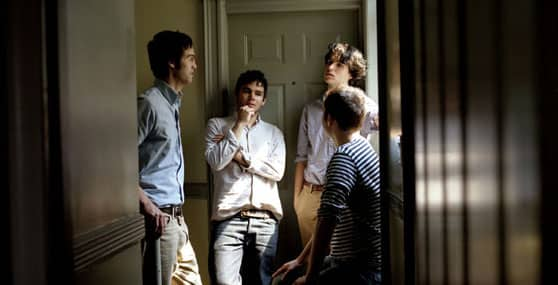Every Monday, FADER editorial director Peter Macia will ease in to the work week by writing semi-extensively about something that is making his head hurt. This week, he inaugurates the column with a rambling, incredibly reductive and incoherent theory, inspired by The Who's halftime performance at the Super Bowl, about why Vampire Weekend is the most provocative band in the world right now.
Watching Pete Townshend and Roger Daltrey, two men older than my dad, sing "Baba O'Reilly" and "Won't Get Fooled Again" during halftime last night is what I imagine watching Grey's Anatomy is like. I never got into that show, but every time I happened by it or read about it on a blog, for like two years, that one patient guy that the blonde doctor was in love with was still dying and then I think he was a ghost for awhile? As Townshend did one-inch scissor kicks and kept getting his frayed blazer caught in his guitar strings and Daltrey got winded after a harmonica solo, I thought, this is it, the end of the ’60s, finally. One of the era's defining bands singing its most anti-establishment songs at the Super Bowl for several million dollars in a stadium full of people who weren't even there to see them. Not to mention, the lyrics to those two songs probably meant something totally different to about half the people in the audience who think Obama is a socialist and don't really care that the US has 200,000 troops at war. It was better metaphorically than Woodstock 1999 going up in flames because of Limp Bizkit. It illustrated perfectly what has changed since Townshend gave acid-crazy Abbie Hoffman a gut shot at the first Woodstock and told him to "get off my fucking stage." This was more than a few old Boomers selling their principles to corporate America (at least they weren't temporarily The Who Dat?), it was the end of an era, and it made me think of Vampire Weekend.
A week or so ago, on the release of VW's eventual #1 album Contra, music critic and internet friend of mine, Jessica Hopper wrote a scathing indictment of the band as musical imperialists, partially based on her reading of this actually really enlightening profile of VW by The Guardian. Fellow critic Nitsuh Abebe responded with a public chastening. There were probably a bunch of other crazy responses but what's the point (have not even dipped into Christgau's epic yet). A bunch of people (critics mostly) were mad because of VAMPIRE WEEKEND.
What everyone failed to recognize in all the sermonizing about cultural appropriation and racism and whatever else is why that band actually made them angry. Here's why. They're getting old. The way things were are no longer how things are. The hardcore/indie/punk/rap groups of Hopper's and everyone else her age's youth are no longer relevant to the current state of music, or the current state of the world, any more than The Who. Real older people—let's say over 45—are not frightened by loud rock & roll anymore, they are listening to it. They jam Springsteen and John Lennon and the Velvet Underground (Lou Reed is older than Roger Daltrey, btw), and they are certainly not going to call the riot squad when a young person is mad about something. They started that shit. Every band that came in the wake of the ’60s—punk, the seminal underground bands of the ’80s and ’90s—is now old enough to be the parents of legally aged children. These legally aged children—including the members of Vampire Weekend, all born in the mid ’80s—grew up listening to music from anywhere, undivided by record shelves or geography, but more importantly they grew up with multiple outlets to express frustration and share with others how much it sucks to be young/ugly/fat/different/poor/rich/white/not white/straight/gay/whatever. They don't need to make angry music, and no young person needs to hear it. If you don't understand this, read Hipster Runoff for a few days in a row. Or listen to Contra.
In his upcoming new book, Reality Hunger, David Shields intentionally takes a quote from Lisa Page's letter to the editor of The New York Times out of context: "In our hunger for all things true, we make the facts irrelevant." Coincidentally, on the facing page are the words "art is theft." Repeat these two fairly obvious assertions like a mantra for the next 20 years, and you'll be ready to be a 25-year-old in 2010. And ready to not be offended by anything Vampire Weekend does. They are basically updating their status on every song they make—there is no call to action, no relation of facts. Ezra Koenig is not distraught over being upper middle class and seeking a solution, just kind of pondering it. There is no rallying cry to join any movement. But this is where he and his band are misunderstood most. Critics apply the old standards to them and are angered by the fact that the apparent heir to The Who and The Sex Pistols, is a bunch of fairly well-off kids with no axe to grind. Yelling about the grossness of Vampire Weekend fits nicely, and totally unfairly, into a conversation about corporate greed. And here's where it gets really funny.
For so long, young socially and culturally aware people have associated themselves and attempted to identify with poverty, angst and social injustice—and done so rather successfully—that it is no longer acceptable to be ignorant of racism, sexism, oppression of any kind, ie all the things that musicians used to rail against. Society used to suck a lot more, and art was used to tell it just how much. But now that everyone knows what sucks and how much, any art drawing attention to that feels redundant. This has been a slow progression from the bleeding heart folk of the early ’60s to now, when anything even remotely earnest gets major eyerolls, and it's not uniquely American or Western. Music, in general, just isn't mad about anything anymore. I honestly can't think of one angry song that I listened to recently. Maybe something like Pissed Jeans' "Dream Smotherer," but that only sounds angry, it's funny more than anything. And this is what seems to really upset older critics. Vampire Weekend are aware of the weird things they say and do and aren't ashamed of it. In fact, they're frustrated by the constant critical misunderstanding, which of course only makes critics even angrier.
And this is my point (finally): the relationship between Vampire Weekend and critics is just like my relationship to my dad when I was 16. I would do something I thought was acceptable, and my dad would get mad and yell at me. I would then be like, dude, why are you so mad? And then he would get mad because he couldn't have done it when he was my age. Am I making sense? Who knows. I'm just saying that Vampire Weekend is nothing to get mad about.



